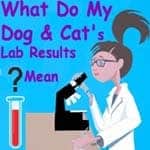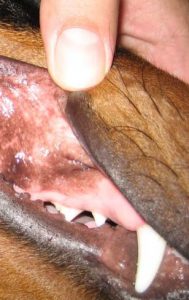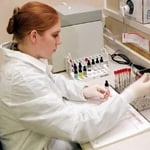Ron Hines DVM PhD
 See What Normal Blood & Urine Values Are
See What Normal Blood & Urine Values Are
 Causes Of Most Abnormal Blood & Urine Tests
Causes Of Most Abnormal Blood & Urine Tests
Your Pet’s Blood Coagulation Time – Also Called Clotting Time or Buccal Mucosal Bleeding Time
When your pet is bleeding more than would be expected from a skin wound, one of its body openings or blood is appearing in its stool, your vet will want to know the status of its blood clotting mechanism (hemostasis). Your vet will have the same questions when your pet is anemic and the cause is not readily apparent. Alternatively, your vet might time how long it takes a drop of your pet’s blood placed on a glass slide to coagulate. Read about that test here.
Most veterinarians today would request a prothrombin time (PT) or activated partial thromboplastin time (APTT) test to determine that; but the older, coagulation or clotting time tests, when performed by pricking your pet’s inner lip, (Buccal mucosal bleeding time) or by short clipping a toenail provides useful information as well. The links to the more current tests are at the bottom of this page.
Reasons Your Pet’s Clotting Time Might Be Increased (Slowed):
Low blood platelet (thrombocyte) counts (thrombocytopenias). Too high a dose or a sensitivity to aspirin and other NSAID anti-arthritic and pain-relieving medications, Exposure to certain rat and mouse poisons, Disseminated Intravascular Coagulation (DIC), Inherited bleeding disorders (hemophilias), low blood fibrinogen levels, Chediak-Higashi syndrome in cats
Blood coagulation/clotting time can also be increased in liver failure due to reduced clotting factor production. (read here) and in a specialized form of liver disease, portosystemic shunts. (read here)
Reasons Your Pet’s Coagulation Time May Be Shortened (Too Rapid)
Dogs with obstructions to the flow of bile from their liver to their intestine sometimes have a more rapid than normal blood clotting time (= hypercoagulability). (read here)
Complementary Tests:
Platelet count, blood fibrinogen level, prothrombin time (PT) or activated partial thromboplastin time (=APTT), von Willebrand factor
DxMe
You are on the Vetspace animal health website
Visiting the products that you see displayed on this website help pay the cost of keeping these articles on the Internet.


